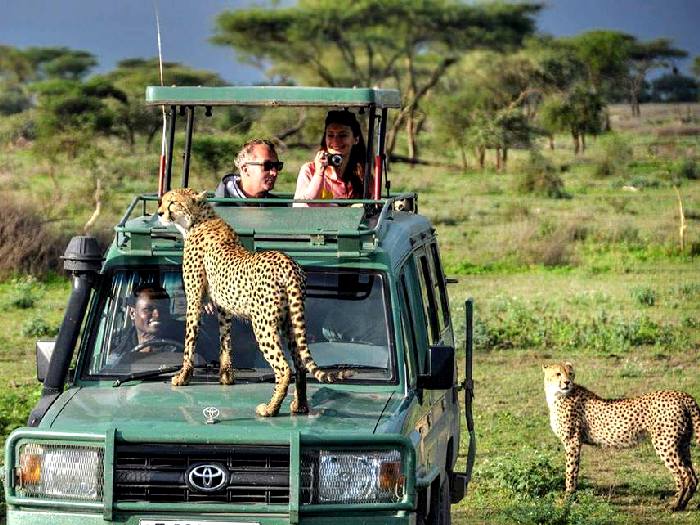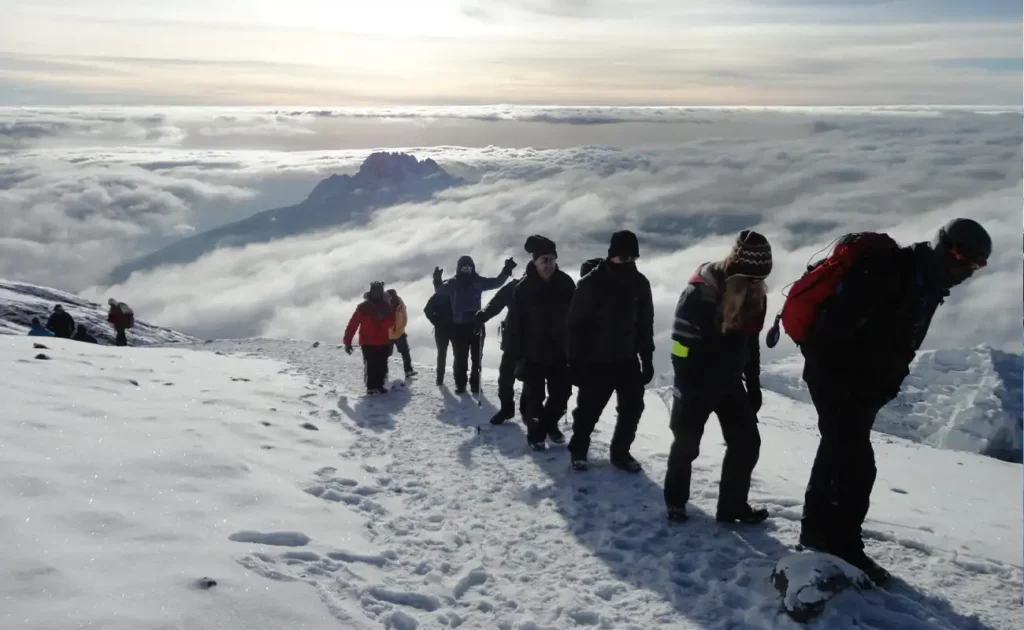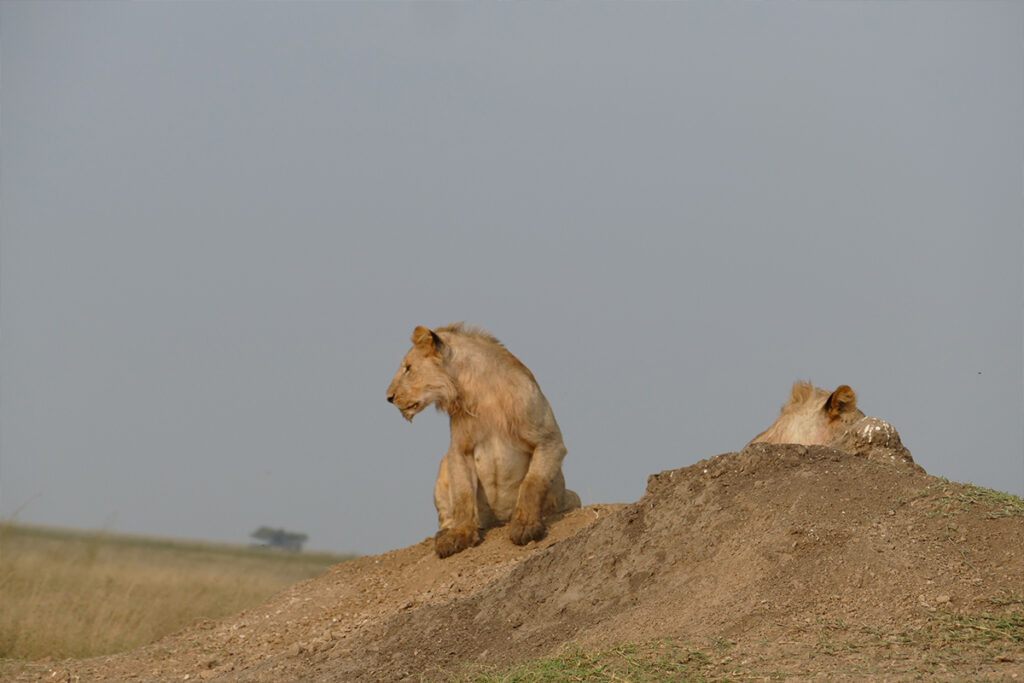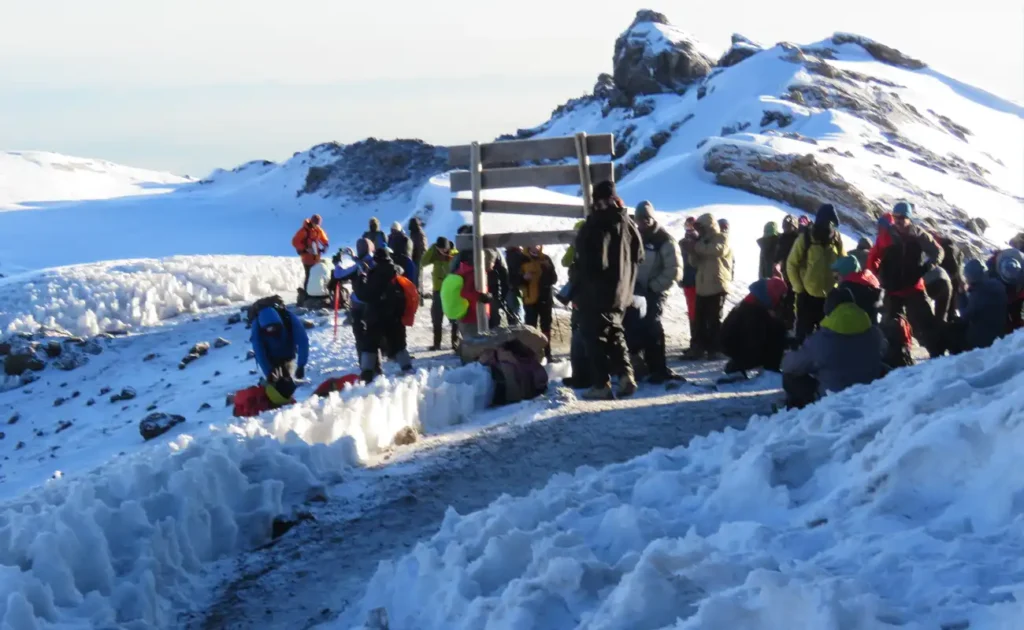With over one million tourists visiting Tanzania each year, the allure of its magnificent safaris is undeniable. Concerns about safety often emerge as a natural consideration for such adventurous endeavors. But statistically, incidents involving tourists are remarkably low, making Tanzania safaris safer than many might anticipate.
Historically, safaris in Tanzania have been well-regulated, with trained guides ensuring both adventure and security. Tour operators comply with strict safety standards, minimizing risks and enhancing the overall experience. It’s worth noting that Tanzania’s commitment to tourism safety has made it a top destination for wildlife enthusiasts globally.

Is Tanzania safari safe?
More than one million tourists visit Tanzania’s national parks each year. Despite potential concerns, these safaris are generally very safe. The government and tour operators take numerous measures to ensure the safety of visitors. Parks are well-patrolled, and guides are trained to handle various situations.
For example, safari guides undergo rigorous training on safety protocols. Many lodges and camps also adhere to strict standards to protect guests from wildlife hazards. According to this post, interactions with animals are carefully monitored. Visitors are well-informed about how to behave around wildlife, significantly reducing risks.
Additionally, medical facilities are often available within close reach. Tourists are advised to have travel insurance, ensuring prompt medical attention if needed. According to here is the article, having insurance and knowing emergency contacts is crucial on adventures like climbing Kilimanjaro. By being prepared, the chances of a safe and enjoyable trip are greatly enhanced.
When planning your safari, select reputable tour companies. These companies typically provide pre-trip safety briefings. A reliable operator will have a proven track record of maintaining guest safety. Reading previous guests’ testimonials can offer additional peace of mind before embarking on your adventure.
Overview of Tourism Safety in Tanzania
Tanzania is a top tourist destination in Africa, known for its safaris and natural beauty. The government has put numerous measures in place to ensure the safety of tourists. National parks and reserves are regularly patrolled, providing a secure environment for visitors. Local communities also play a role in maintaining safety, creating a collaborative effort.
Tour operators in Tanzania adhere to strict guidelines to protect their clients. They employ trained guides who are knowledgeable about safety protocols and wildlife behavior. Additionally, accommodations like lodges and camps are equipped with necessary safety features. Emergency plans and medical support are also readily available. This makes the overall experience both exciting and secure.
Despite these measures, it’s important for tourists to be aware and follow safety guidelines. Simple actions like listening to your guide and keeping a safe distance from animals can go a long way. Tourists are also encouraged to have travel insurance, covering unexpected incidents. This proactive approach ensures a worry-free adventure.
Furthermore, Tanzania has a good track record when it comes to tourism safety. The majority of visitors enjoy their trips without any issues. Reading reviews and testimonials can provide additional peace of mind. This helps in setting realistic expectations and preparing effectively for the safari.
Key Safety Measures for Safari Goers
Before embarking on a safari, it is crucial to get a comprehensive briefing from your tour operator. They provide essential information on the dos and don’ts while out in the wild. Listening to these instructions carefully can be a significant factor in ensuring your safety. This initial briefing often includes guidelines on how to behave around wildlife and what to do in case of an emergency.
Sticking to designated paths and trails is another important safety measure. This helps in avoiding unexpected encounters with wild animals. Safari vehicles are designed to offer maximum protection, so it is advisable to remain inside the vehicle unless your guide suggests otherwise. Guides are trained to identify potential dangers and take necessary precautions. This ensures a safe yet thrilling experience for everyone.
Having the right clothing and gear is also vital for your safety. Light, long-sleeved shirts and pants help protect against insect bites and sunburn. Wearing comfortable and sturdy shoes is also a good idea, especially if you plan to go on walking safaris. Carrying a small first-aid kit with essentials like painkillers and antiseptics can be extremely useful in minor situations.
Lastly, make sure to stay hydrated and well-nourished during your safari. The African sun can be harsh, and dehydration can occur quickly. Drinking plenty of water and eating regularly can keep you in good condition throughout your adventure. Simple preparations like these can make a big difference in having a safe and enjoyable safari experience.
Common Safety Concerns and How They’re Addressed
One significant concern for safari goers is the threat of encountering dangerous wildlife. Tour operators address this by employing highly trained guides who know animal behavior well. They keep safe distances from animals and advise tourists on how to act in their presence. This ensures that both the tourists and the wildlife remain unharmed.
Another worry is the risk of contracting diseases from insect bites. To mitigate this, tourists are often instructed to wear long-sleeved clothing and use insect repellent. Vaccinations for common diseases, such as malaria, are also recommended before traveling. Lodges and camps typically have mosquito nets and screens to further protect visitors.
Dehydration and heat exhaustion are common concerns due to Tanzania’s hot climate. Tour guides advise tourists to drink plenty of water and to take breaks in shaded areas. Carrying a reusable water bottle and high-energy snacks can help maintain energy levels throughout the trip. These simple tips can prevent serious health issues.
Getting lost or separated from the group can be alarming. To avoid this, guides use clear instructions and establish specific meeting points. They also carry communication devices to stay in contact with their base and each other. Having a buddy system can further ensure that no one strays off alone.
Finally, accidents can occur during activities like walking safaris or climbing. First-aid kits are always on hand, and guides are trained in basic medical response. Emergency evacuation plans are in place should a serious incident arise. This holistic approach to safety keeps everyone prepared and protected.
Role of Tour Operators in Ensuring Safety
Tour operators play a crucial role in ensuring a safe safari experience. They carefully plan itineraries that maximize safety while offering an unforgettable adventure. By selecting secure travel routes and well-maintained vehicles, they reduce the risk of accidents. Experienced tour guides further enhance safety measures.
Key to their strategy is the training they provide to their staff. Guides are not only trained in wildlife behavior but also in first aid and emergency response. This comprehensive training means they’re prepared to handle unexpected situations. Tour operators continuously update their safety protocols to comply with international standards.
Moreover, tour operators ensure all accommodations meet strict safety guidelines. Camps and lodges use security measures such as monitored gates and trained guards. The use of animal-proof storage on campgrounds minimizes risky interactions with wildlife. Visitors can sleep peacefully knowing their safety is prioritized.
Communication technology also plays a vital role. Operators equip their guides with radios or satellite phones to report any emergencies promptly. This quick communication allows for efficient coordination with rangers and medics if necessary. Such measures significantly reduce response times in case of incidents.
Finally, tour operators educate their clients thoroughly before the safari begins. Pre-safari briefings cover essential behaviors and the importance of wildlife conservation. This proactive education helps travelers understand their role in staying safe. It’s a collective effort that ensures a memorable and secure adventure for all participants.
Testimonials and Experiences from Previous Visitors
Many visitors who have embarked on a Tanzania safari praise the high level of safety they experienced. Jane from New York shared, “Our guide was incredibly knowledgeable and made us feel safe at all times.” Numerous travelers echo this sentiment, highlighting the professionalism and preparedness of their guides. These guides are often mentioned as key reasons for their positive experiences.
Some travelers also focus on the safety of accommodations. Tom from London mentioned, “Our lodge had excellent security, and the staff made sure we had everything we needed.” He appreciated the thorough checks and safety precautions that were in place. Knowing that the lodges are secure adds a significant layer of comfort for many tourists.
Various online reviews reveal that visitors felt well-informed about safety protocols. One family from Australia noted, “The pre-trip briefing was very helpful, covering everything from wildlife interactions to health precautions.” This proactive communication helped them feel both prepared and secure. Clear guidelines relieve many common travel anxieties.
Wildlife encounters, while thrilling, were also managed safely. Maria from Spain recalled, “Seeing a pride of lions was awe-inspiring. Our guide made sure we kept a respectful distance and stayed quiet.” These experiences are a testament to how well-planned and executed the safaris are. The balance between excitement and safety is well-maintained.
Overall, the testimonials paint a picture of a well-orchestrated and secure adventure. Positive feedback consistently emphasizes the thoroughness of the safety measures in place. Personal stories and reviews provide valuable reassurance to potential visitors. Reading these experiences can help others feel more confident in their decision to embark on a Tanzania safari.

Frequently Asked Questions
Tanzania safaris attract many visitors looking for an adventurous yet safe experience. Here are commonly asked questions to help you better understand what to expect during your trip.
1. What precautions should I take on a Tanzania safari?
Listening to your guide is crucial for safety. Always follow their advice and instructions. It’s important to stay inside the vehicle during game drives. If you are on a walking safari, walk in a single file under the guide’s directions.
Wear appropriate clothing to protect against the sun and insects. Bring necessary medications and a first-aid kit. Staying hydrated is essential, so carry enough water. Additionally, having travel insurance for unexpected incidents is advisable.
2. How do tour operators ensure safety during a safari?
Tour operators carefully plan itineraries and routes, considering all potential risks. They employ experienced and trained guides who understand animal behavior. Accommodations are chosen for their safety and secure environments.
Communication systems are in place for quick response to emergencies. Operators maintain their vehicles and equipment to high standards. Pre-safari briefings also prepare tourists on how to stay safe during activities.
3. What health precautions should I take before a Tanzania safari?
Consult with your doctor well before the trip. Ensure you have the necessary vaccinations for traveling to Tanzania. Malaria is a concern, so take anti-malarial medications if recommended by your doctor.
Pack insect repellent and long-sleeved clothing to prevent mosquito bites. Bring any personal medications and a basic first-aid kit. Staying aware of and following health guidelines during your safari helps maintain your well-being.
4. Are walking safaris safe compared to vehicle safaris?
Walking safaris offer a different experience, bringing you closer to nature. They are generally safe when conducted by trained guides. Guides lead the way, teaching you how to walk and behave around wildlife.
The emphasis is on safety and respect for animals. Walking safaris follow strict routes and timings to minimize risks. Wearing appropriate shoes and clothing is also important for your comfort and protection.
5. How do I choose a safe tour operator for my safari?
Look for operators with good reviews and high safety standards. Recommendations and testimonials from previous clients can guide your decision. Reputable operators are usually accredited by tourism organizations, which adds a layer of trust.
Contact the operator and ask about their safety measures and guide training. Transparent operators will readily share this information. This ensures that you select a reliable and safe tour company for your adventure.



